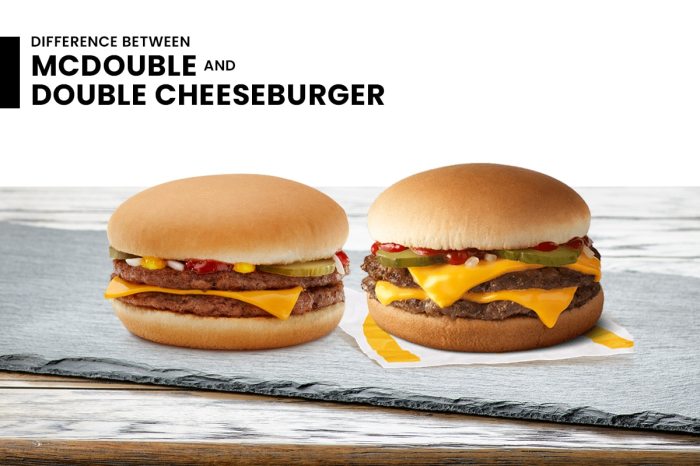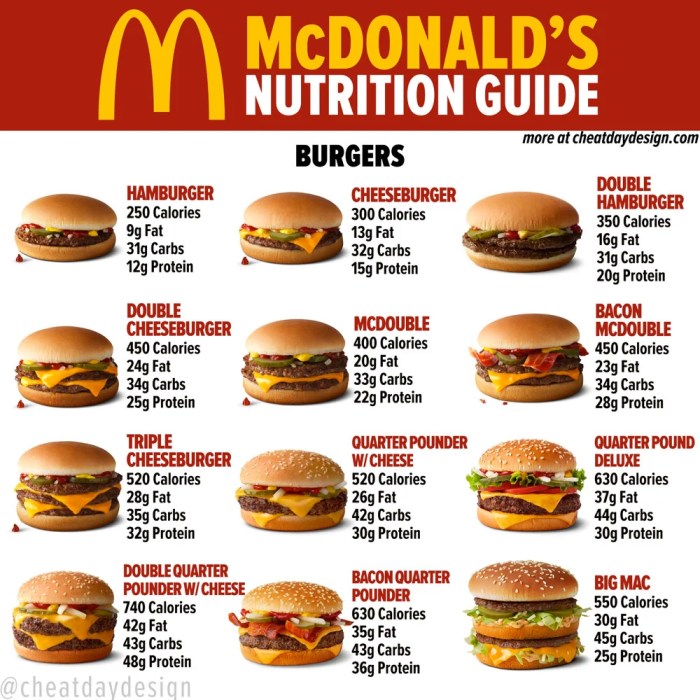Comparison with Other McDonald’s Items

Nutrition facts for mcdonald’s mcdouble – Let’s delve into the fascinating world of McDonald’s burgers, specifically comparing the nutritional powerhouse (or perhaps, power-nap inducer) that is the McDouble to its heftier, more flamboyant cousins. We’ll examine the caloric, fatty, and sodium-laden landscapes of these fast-food titans, offering a nutritional showdown for the ages. Prepare for a data-driven duel!
The McDouble, with its deceptively simple construction, often surprises people with its surprisingly robust nutritional profile. While it might seem like a lightweight contender compared to the Big Mac or Quarter Pounder, a closer look reveals a surprisingly dense concentration of…well, let’s just say “ingredients.” This comparison will unpack the differences, highlighting the impact of ingredient choices on the overall nutritional value.
Nutritional Comparison of McDonald’s Burgers, Nutrition facts for mcdonald’s mcdouble
The following table provides a clear comparison of the caloric, fat, and sodium content of the McDouble, Big Mac, and Quarter Pounder. Remember, these values are approximate and can vary slightly depending on location and preparation. Consider this a snapshot of the nutritional battlefield.
| Burger | Calories (approx.) | Total Fat (g, approx.) | Sodium (mg, approx.) |
|---|---|---|---|
| McDouble | 390 | 19 | 860 |
| Big Mac | 590 | 30 | 970 |
| Quarter Pounder with Cheese | 530 | 28 | 1000 |
Ingredient Differences and Nutritional Impacts
The key differences lie in the sheer number of ingredients and their respective caloric contributions. The McDouble, being the minimalist, relies on two beef patties, cheese, special sauce, onions, and pickles. The Big Mac introduces additional layers of complexity with its three-tiered bun system, lettuce, sesame seeds, and a more generous spread of “special sauce.” The Quarter Pounder with Cheese, while simpler in structure than the Big Mac, boasts a significantly larger patty, leading to higher calorie and fat content.
So, you’re checking out the McDouble’s nutrition facts, huh? Pretty standard fast food stuff, right? But have you ever considered something totally different, like checking out the moose meat nutrition facts ? It’s a wild comparison, I know, but it makes you think about how varied nutrition can be. Anyway, back to that McDouble – let’s see how many calories you’re really dealing with!
The additional ingredients in the Big Mac and Quarter Pounder contribute significantly to their higher calorie, fat, and sodium counts.
Health Implications of Choosing a McDouble
While the McDouble boasts a lower calorie and fat count compared to its larger brethren, it’s still a relatively high-sodium meal. The high sodium content can contribute to water retention and increased blood pressure. Choosing a McDouble over a Big Mac or Quarter Pounder represents a reduction in overall calories and fat intake, but careful consideration should be given to the sodium levels.
Regular consumption of high-sodium meals can have significant long-term health consequences. A balanced diet and mindful choices remain paramount, regardless of which McDonald’s burger one chooses (or chooses to avoid entirely!).
Nutritional Context and Dietary Guidelines

Let’s face it, a McDouble isn’t exactly a health food halo winner. But understanding its nutritional profile allows for informed choices, transforming a guilty pleasure into a calculated indulgence. This section provides a practical guide to navigating the McDouble’s nutritional landscape, considering portion control and its alignment with established dietary recommendations.The McDouble, in its standard glory, packs a considerable punch in terms of calories, fat, and sodium.
One serving – and let’s be honest, most people don’t stop at one – provides a significant portion of the recommended daily intake of these components, potentially exceeding limits for individuals with specific dietary needs or health concerns. Therefore, mindful consumption is key.
Serving Sizes and Portion Control
Understanding serving sizes is paramount. A single McDouble is considered one serving. However, consuming multiple McDoubles in one sitting dramatically increases the overall nutritional impact. To illustrate, two McDoubles double (pun intended) the calorie, fat, and sodium intake, significantly impacting daily nutritional goals. Portion control, therefore, involves limiting the number of McDoubles consumed per occasion and integrating them thoughtfully into a balanced overall diet, rather than making them a dietary cornerstone.
McDouble and Dietary Guidelines
The USDA’s Dietary Guidelines for Americans emphasize a balanced diet rich in fruits, vegetables, whole grains, and lean protein. A McDouble, unfortunately, falls short on many of these fronts. Its high saturated fat content and sodium levels clash with recommendations for minimizing these elements to reduce the risk of heart disease and other health problems. While a McDouble can technically fit intosome* dietary plans, it should be considered an occasional treat rather than a staple food.
Its nutritional profile makes it a poor choice for individuals aiming to adhere strictly to dietary guidelines promoting weight management or those with pre-existing health conditions.
Potential Impact of Frequent McDouble Consumption
Regular consumption of McDoubles can contribute to several health concerns. The high calorie and fat content can lead to weight gain and increase the risk of obesity. The elevated sodium levels contribute to high blood pressure, a significant risk factor for cardiovascular disease. Moreover, the lack of essential nutrients like fiber and vitamins in a McDouble means that relying on it as a regular food source could lead to nutritional deficiencies.
For example, consistent McDouble consumption might lead to an individual experiencing fatigue, weakened immunity, and other symptoms associated with inadequate nutrient intake. Think of it this way: a McDouble a day might keep the doctor away…but it might also invite a whole host of other health problems.
FAQ Corner: Nutrition Facts For Mcdonald’s Mcdouble
Is the McDouble suitable for vegetarians?
No, the McDouble contains beef.
Does McDonald’s offer a lower-sodium McDouble?
Not currently; however, they may offer healthier alternatives.
Can I customize a McDouble to reduce its calorie count?
You can ask to remove or reduce certain ingredients like cheese or sauce, but this will need to be checked with your local McDonald’s.
How does the McDouble compare to a similar-sized homemade burger?
Homemade burgers can offer more control over ingredients and often have lower sodium content but may vary significantly in nutritional profile depending on preparation.
